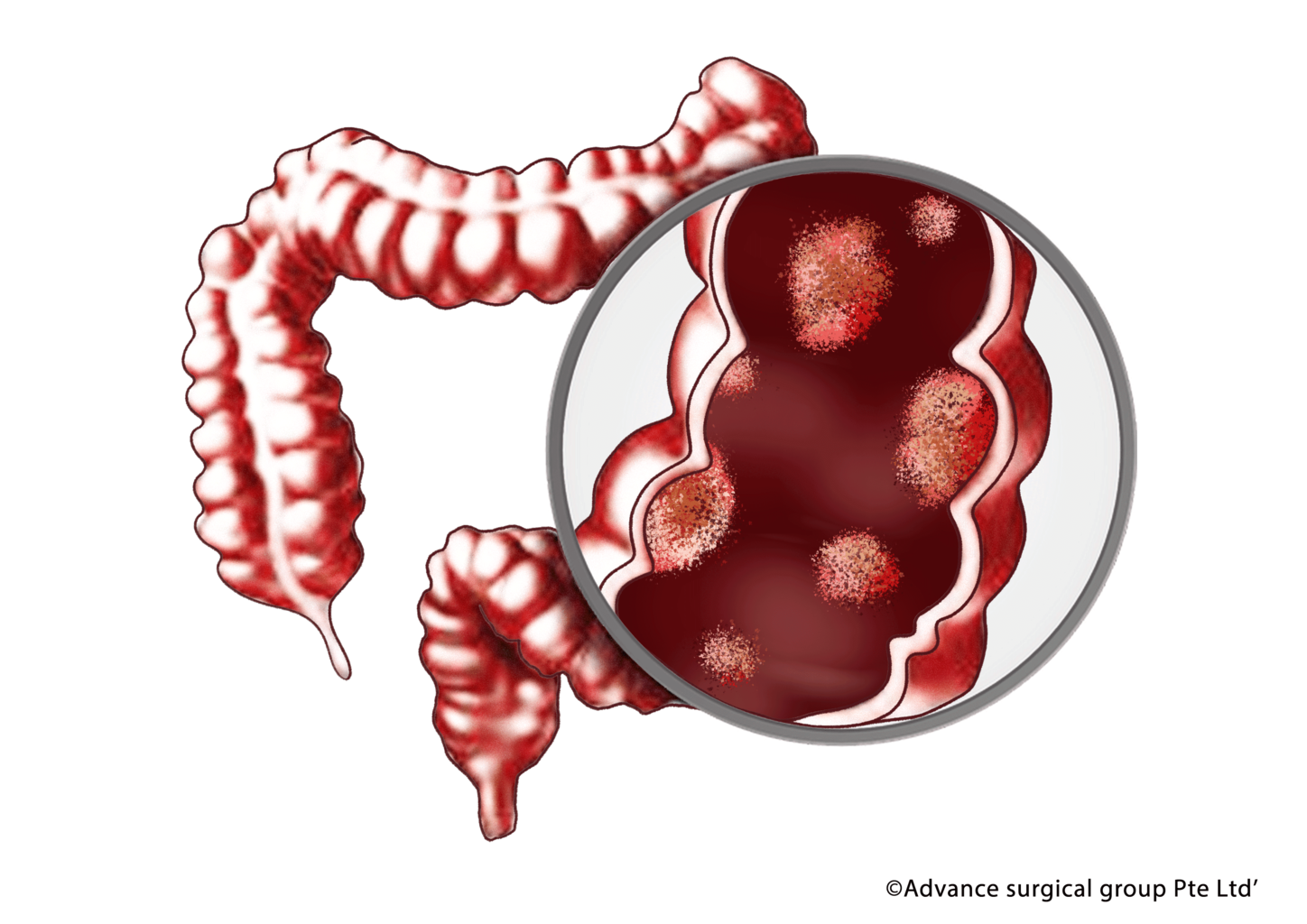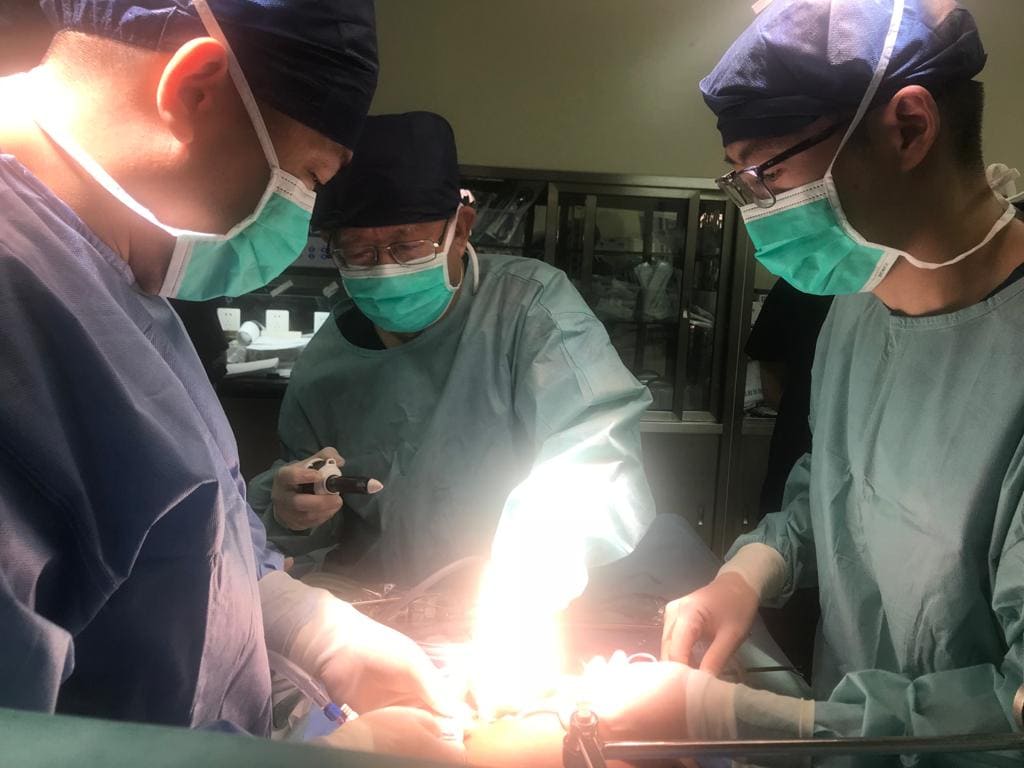Notice: As part of our surveillance and to reduce risk of infection, we have updated our patient and visitor policy. Click here for more information
Colorectal Cancer (Aka Colon Cancer)
Causes, Symptoms and Treatment
What is colorectal cancer?
Colorectal cancer is cancer that appears in the rectum or colon. It is also known as colon cancer. The colon is the large part of the intestine, whereas the rectum is the passage that connects the colon to the anus. Most of these cancers are adenocarcinoma arising from the inner lining of the intestine.
The cancer begins as abnormal growths called polyps that appear in these areas and are the first signs of impending colon cancer. Not all polyps are pre-cancerous but getting it checked out through endoscopy and biopsied is crucial to identify early stages of the cancer. Better still these polyps can be removed via the scope preventing the cancer from starting in the first place.

How common is colorectal cancer in Singapore?
In terms of cancer, colorectal cancer is the most common and #1 cancer in Singapore. The disease common in both males and female but males have a slightly higher risk. In females it is the number two cancer after breast cancer. According to HealthHub, approximately 1,200 cases are diagnosed each year in Singapore.
What causes colorectal cancer?
The causes of colorectal cancer are multifactorial. they are part genetic and part environmental. Generally, mutations of the DNA in healthy cells in the colon and rectum causes these cells to mutate. These lead to cancerous cells that continue to divide to form a tumor. The factors associated with cancer are:
Older Age
Colorectal cancer can occur in young adults and teenagers, but the majority of colorectal cancers occur in people older than 40. For colon cancer, the average age at the time of diagnosis for men is 68 and for women is 72. For rectal cancer, it is age 63 for both men and women.
Inflammatory Intestinal Conditions
Diseases causing inflammation of the colon can increase your risk of getting colorectal cancer. This includes ulcerative colitis and Crohn’s disease.
Family History and Genetics
It is definitely possible for you to inherit genetic risk if you have a family history of colorectal cancer. This is amplified if it is more than one member of the family having the disease.
Lifestyle and Diet
There are certain dietary habits that may increase your risk, such as eating a low fiber diet, and eating too much red meat and animal fats. The general opinion about diet is disputed but certain studies show association with typical western diet. People who do not exercise regularly and are quite sedentary are also at risk.
Diabetes and Obesity
Generally, people who are overweight have a higher risk of colorectal cancer. This is also true if you have diabetes. These risk can be reversed with metabolic or bariatric surgery.
History of Polyps
Generally having polyps increase your risk of developing colorectal cancer. Certain types of polyps are loaded with greater risk. Removing polyps prevent cancer and can be life saving.
What are the symptoms of colorectal cancer?
Early stage of colorectal cancer is usually painless and you might not experience obvious symptoms. The cancer is silent in the early stages.
The usual symptoms include:
- lower GI bleeding or rectal bleeding in your stool. This will be bright red.
- Abdominal discomfort or Gastric pain
- change in bowel habits where the consistency of your stool is changing. (Diarrhoea or constipation)
- The feeling of not completely emptying your bowel
- Bloatedness and cramps
- Fatigue and constant tiredness
- Small calibre stools
- Loss of weight or appetite.
If you are experiencing these symptoms, it is advisable to see a doctor or specialist to go for cancer surveillance to catch it early.
How do we diagnose for colorectal cancer?
Generally we advise
Faecal Occult Blood Test (FOBT)
This is a rough screening test to look for blood in the stool. A positive result would trigger colonoscopy
Carcinoembryonic antigen (CEA) blood test
CEA is a cancer marker found in the blood. It also monitors the progress of treatment and warns of recurrence after surgery or chemo. Like all cancer markers it is not 100% accurate. There are cases of false positives and false negatives.
Colonoscopy and Biopsy
Colonoscopy is the definitive diagnostic tool for colon problems. This examination allows the doctor to survey the colon and the rectum and even the last part of the small bowel. It is both diagnostic and therapeutic.

Pathologist examine biopsy
Pathology or Histology is to look at the cells obtained from a biopsy. It can confirm the diagnosis of cancer, indicate a different disease and also determine the Grade of the cancer.
CT scan or PET scan.
Computed tomography (CT) and Positron emission tomography (PET) scans are to look for spread of the disease or cancer. Both of the scans are non-invasive imaging techniques to identify abnormalities in the body or colon.
How do we manage colorectal cancer?
Managing cancer depends on the stages of the cancer. This advises the specialist or doctor on the ideal treatment. Cancer is separated into five stage with the ability of recurrence:
Stage 0: Cancer is found in the innermost lining
Stage 1: Tumour grossly visible
Stage 2: Invaded nearby tissue
Stage 3: Spread to lymph nodes.
Stage 4: Spread to liver and lungs. Metastasis.
If the colorectal cancer is at the late stage, an oncologist will need to collaborate in the management. Chemotherapy, targeted therapy or radiotherapy are common adjuncts.
What are the surgical options of colorectal cancer?
Removal of cancerous area. Done through open surgery or laparoscopy which is minimally invasive surgery. Surgical options depends on the progression of the cancer which is advised by the attending specialist or doctor.
What are the risks of untreated colorectal cancer?
Untreated Colorectal Cancer can sometimes go undetected as there are no symptoms but usually there are. Colorectal cancer is treated by surgery but in the late stage of metastases where the cancer has spread to other organs, you would feel:
- Blockage of the intestines causing intestinal obstruction from cancer nodes and tumors
- Bleeding from the rectum
- Changes in breathing if the tumor has spread across the lungs
- Tumor spreads to other organs, leading to organ failure
- Death can be slow and painful.
How do I prepare for an appointment with ASG?
Most appointments concerning colorectal cancer screening would require a consult and colonoscopy. If you are experiencing symptoms of colorectal cancer, please make an appointment with us.
Make an appointment with us today.
Kindly fill out the form below with your details.
Disclaimer: By submitting, you agree to ASG’s terms and conditions.. Please note that your information will be handled confidentially.

